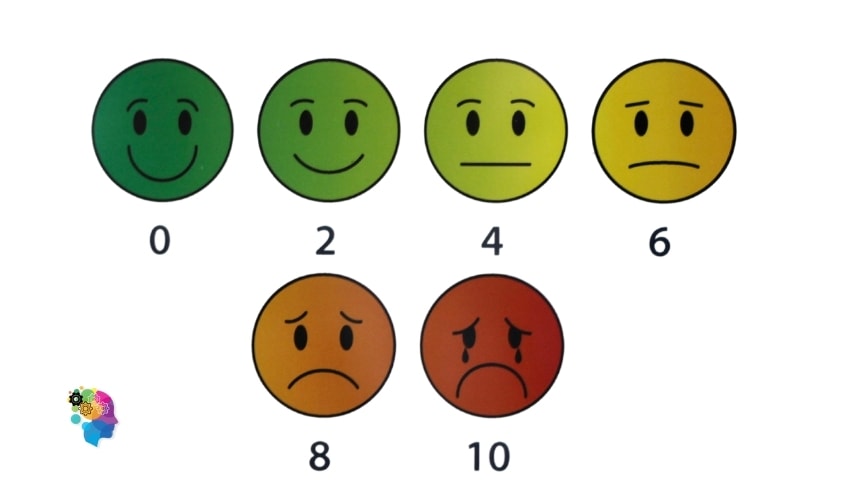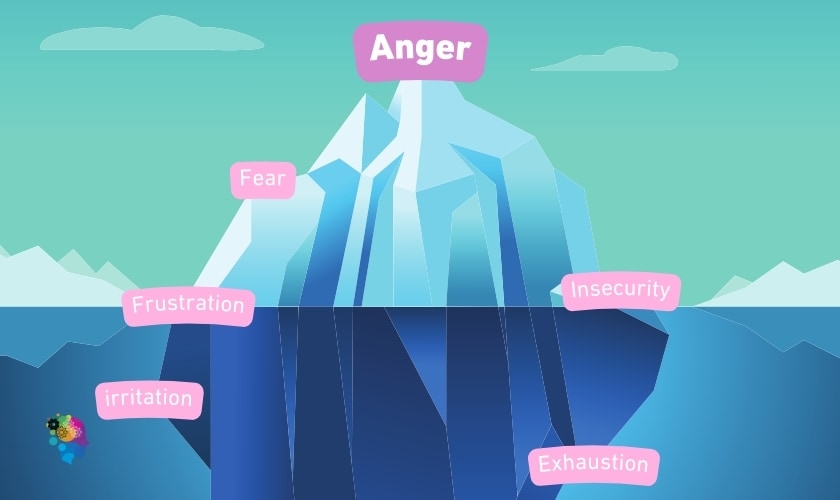Anger Management Techniques And Insights For A Calmer Life
What Is Anger Management?
Anger management is learning how to recognize and cope with feelings of anger healthily and constructively. This may include techniques for managing and reducing the intensity of anger and strategies for preventing and resolving conflicts.
Anger Management Involves
– Identifying triggers
– Monitoring emotions
– Relaxation techniques
– Cognitive-behavioral therapy
– Communication skills
– Conflict resolution
– Stress management
– Seeking professional help
Signs Anger Management Is For You
– Hurting others either verbally or physically
– Experience a great degree of stress from everyday external factors
– Always find yourself feeling angry
– Feel that your anger is out of control
– Frequently regret something you’ve said or done when angry
– Notice that small or petty events affect you
– Find yourself being irritable or mad more often than not
Anger Management Techniques
– Anger Management Therapy
– Identify the problem (self-awareness).
– Think of potential solutions (self-control)
– Consider the consequences of each solution (think it through)
– Make a decision (pick one of your options)
– Listen to music (with your headphones on)
– Draw
– Meditate or practice breathing deeply
– Distract yourself.
– Do Emotional Therapy
– Take a brisk walk
– Breathe slow as you count to 10 before reacting
– Remove yourself from the situation until you’ve calmed down
– Talk to someone about your feelings, preferably a professional
– Exercise or do something calming like yoga or meditation
– Write out your thoughts and feelings in a journal
– Think before you speak
– Once you’re calm, express your anger
– Get a daily physical activity
– Take a timeout
– Practice relaxation skills
– Slowly repeat all the steps above

– Anger Management Workbook for Men: Take Control of Your Anger and Master Your Emotions

– BAUTVAS Squishy Stress Balls for Kids – 8 Pack Color Changing Stress Ball Fidget Toy nito kneados Nido netos nedo Colorful Rainbow Stress Balls Sensory Stress and Anxiety Relief Squeeze Toys

– Jayefo Sports Punching Bag – Hanging Boxing Bag for MMA, Karate, Judo, Muay Thai, Kickboxing, Self Defense Training for Training at Home or Gym – Unfilled Heavy Bag 70 to 100 lbs – Black
Anger management is crucial because anger, if not properly managed, can lead to ruined relationships, legal issues, and even physical violence. It's normal to experience anger, but if you find it challenging to control or express it healthily, there is hope – assistance is available.
This blog post will delve into effective strategies for controlling anger and averting angry outbursts, including the advantages of anger management therapy.
If you struggle with uncontrolled anger, remember, you're not alone and there's no need for shame or embarrassment. Countless individuals face this challenge every day. However, this doesn't mean you have to accept it as a permanent part of your life.

What is anger management?
Anger management refers to how you manage or express anger. People who are good at managing extreme anger can stay calm in tense situations and control their angry feelings. They can healthily express angry thoughts instead of displaying passive-aggressive behavior or deflecting with sarcastic humor.
It’s important to note that if you lose your temper occasionally but feel bad about it afterward, this is not necessarily a sign of anger-control issues. Everyone has occasional angry outbursts, but for some people, these episodes happen more often than they should. Learning to manage your anger will improve personal relationships and mental health.
Learn to control your anger before it controls you. Because unchecked anger can lead to mental health problems. To understand more about anger, we suggest reading Uncovering the Anger Iceberg: Understanding the Hidden Triggers and Emotions.

Definition of anger management
Anger management is a psychotherapeutic treatment for the reduction and regulation of anger.
Causes of anger
Everyone experiences anger, which can often be triggered by environmental factors such as interpersonal problems, noise, crowded spaces, and work.
People who are unable to control their anger may have an anger disorder or other mental health issues. People can get angry for different reasons. Each person’s trigger is unique. For some, it can be a frustrating day at work. For others, it may be the result of being stuck in traffic or dealing with other daily frustrations.
According to studies done on anger, people who are stressed out tend to have more episodes of anger towards their family members and friends.
While many people would like to believe that they only become angry when someone does something wrong, this is simply not true. Studies show that most outbursts start over small disagreements.
Physical signs of anger
Here are some signs to know if you’re getting angry;
- Raised voices
- Clenched fists
- Frowning or scowling
- A clenched jaw
- Physically trembling
- Rapid heartbeats
- Sweating excessively
- Pacing excessively
- Dizziness
- Screaming
- Stomach ache
- Increased and rapid heart rate
Is anger management for me?
If you find yourself feeling angry often, or if those around you tell you that your anger is a problem. You may benefit from anger management. Below are some points that will inform you if you require anger management;
- Hurting others either verbally or physically.
- Experience a great degree of stress from everyday external factors
- Always find yourself feeling angry.
- Feel that your anger is out of control.
- Frequently regret something you’ve said or done when angry.
- Notice that small or petty events affect you
- Find yourself being irritable or mad more often than not.
If you are an angry person looking to get more out of life, gain confidence, become happier with who you are, learn how to manage issues before they become problems, regain peace of mind, break patterns that don’t work, live up to potential, create sustainable change in your relationships, or increase happiness in your life then yes anger management classes are for you.
Asking for help is the first step in getting better and taking control of your life. It doesn’t matter what others may say. Seeking help to feel better about yourself shows strength and courage; it’s not something to be ashamed of.
Anger management involves
Anger management involves the use of tools and guidance to help you become happier and healthier as you learn how to understand oneself better so you can have a more fulfilling life.
One thing you learn is the use of mindfulness techniques which will help you gain control over your anger and identify triggers. It’s all about you learning new coping skills for when stress starts to creep in. Some people learn how to do deep breathing, meditation, exercise, or relaxation therapy techniques to assist in managing anger.
Benefits of anger management
There are many benefits to anger management. For one, it can help you get rid of negative thoughts and reduce anger. It’s also a great way of expressing anger in a healthy way that will lead to a better quality of life. Because when you’re not always flying off the handle from being upset about something, your relationships with others will improve.
You can have a better understanding of what others want, improved empathy which leads to being able to cooperate with others for a more peaceful situation. As well as overcoming creative differences.
Other benefits include new Insights and better judgment. As a result of your increased self-awareness, you are more inclined to take responsibility for your feelings and behaviors. You’ll evaluate frustrating situations honestly rather than deflecting blame and know how to control your anger before it controls you. Let’s not forget better health, as medically reviewed articles have stated.
Anger management help
Look for a qualified mental health professional with expertise in treating anger if you want assistance for your fury. They may give individual or group therapies. Psychologists are highly trained professionals who develop therapy regimens to fit each patient’s specific requirements. Controlling anger can be assisted by a licensed mental health professional.
Other options include an online anger management plan, books, and videos on anger management. Remember a family member cannot be a substitute for professional help, here’s where you can get the professional help we recommend;
- Your GP (doctor)
- Counselor
- Psychologist
- Kids Helpline – telephone counseling service for young people aged 5-25 (24 hours, 7 days) Tel. 1800 55 1800
- Lifeline (24 hours, 7 days) Tel. 13 11 14

Anger management techniques
Slow breathing can be used to reduce frustration and help control anger. Using mental imagery as a coping technique when experiencing high-stress levels to calm oneself down, as opposed to lashing out in anger at others. Breathe deeply while practicing a loving-kindness meditation to increase levels of empathy and compassion is a good way for anger management. Replacing anger with a healthy emotion could also assist to reduce high blood pressure.
Controlling outbursts of anger
- Breathe slow as you count to 10 before reacting
- Remove yourself from the situation until you’ve calmed down
- Talk to someone about your feelings, preferably a professional
- Exercise or do something calming like yoga or meditation
- Write out your thoughts and feelings in a journal
- Think before you speak
- Once you’re calm, express your anger
- Get a daily physical activity
- Take a timeout
- Practice relaxation skills
- Slowly repeat all the steps above
Ways to manage anger
Controlling anger can be difficult, however, if you do not learn ways to manage your anger it can affect your mental health. Even sleep deprivation can cause more anger. Anger is a natural human emotion that everyone experiences from time to time. It’s normal to get angry, however, some people experience more uncontrollable anger than others and it can lead to mental health issues.
If you think about anger like an iceberg; nine out of ten times the first step is awareness and identifying what angers us and how we deal with those feelings. Anger can build up like steam in a pressure cooker and explode at the smallest thing or create more serious problems such as relationship issues or even health problems such as high blood pressure or diabetes.
When you feel angry or even mild irritation, use these methods as ways to manage your anger;
- Identify the problem (self-awareness).
- Think of potential solutions (self-control)
- Consider the consequences of each solution (think it through)
- Make a decision (pick one of your options)
- Listen to music (with your headphones on)
- Draw.
- Meditate or practice breathing deeply
- Distract yourself.
- Do Emotional Therapy
- Take a brisk walk

Anger management therapy
What is anger management therapy?
Anger management uses relaxation techniques and mental imagery to improve coping skills. This may also involve role-playing and exposure therapy, in which the therapist helps the client confront situations they fear or avoid because their anger may take over.
Therapists and counselors specialize in helping people learn how to deal with their anger healthily. They’ll be able to diagnose if your anger stems from other mental health issues. Don’t let your anger control your life – get the help you need today.
Some countries regard anger management therapy so important it is a mandated treatment for violent criminal offenses. It plays a valuable part in mental health and teaches them how to influence their negative thought patterns.
Anger management therapy session explained
A typical one-to-one anger management class will take place either at your home or the therapist’s office. You and your therapist will work together to explore if there are any issues from childhood that have helped shape your view on life and have contributed to the way you are today.
Focusing on internal events and looking at factors such as self-esteem, your emotional state, communication styles, or past experiences. These can help provide answers as to why this behavior continues. I may suggest anything I see fit which might be beneficial.
How long does anger management therapy last?
Anger management therapy is often about four to six weeks in length, although it may take longer. Counseling and cognitive behavioral therapy are both common forms of anger management treatment.

How do therapists treat anger issues?
CBT, cognitive-behavioral therapy, has been a popular treatment for anger for a long time and can improve your mental health. CBT is a type of cognitive psychotherapy that aims to help people change their negative or unhelpful thoughts and beliefs. Stress Inoculation is one CBT-based anger treatment.
This consists of instruction in how to relax effectively, coping skills training (learning what to do when someone provokes you), empathy training (learning to identify the triggers that lead to your anger), self-monitoring (recording when and where you become angry), and cognitive restructuring (exploring patterns in your previous responses). It also teaches you what physical warning signs to look out for when it comes to anger expression.
Unhelpful thinking styles are identified and countered, while helpful ones are reinforced. The therapist will also help the patient to identify positive goals or things they want out of their lives. At times, this process can be difficult for patients because it may involve changing longstanding personality traits. However, research has shown that patients who complete CBT show lower levels of anger compared with those who don’t take part in treatment.
Self-care after anger management therapy
Self-care has been scientifically proven to reduce or eliminate anxiety and sadness, minimize stress, enhance attention, decrease frustration and chronic anger, increase happiness, improve energy, and more.
From a physical health perspective, self-care has been scientifically proved to decrease mental health issues, strengthen a weakened immune system, lower heart disease, stroke, and cancer. From a religious standpoint, it may also aid us in keeping in touch with our higher purpose as well as understanding our role in the world.
Personally speaking, I have found that engaging in a regular self-care routine has helped keep me feeling more calm and relaxed throughout the day. It allows me to find peace by being more present with myself.
Self-care suggestions
- Sleep at least 7 hours per night.
- Interact with nature outside.
- Engage in some form of exercise.
- Breathe fresh air.
- Put on soothing music or nature sounds.
- Meditate for 10 minutes.
- Journal about your thoughts and feelings using a gratitude journal.
- Practice yoga or another form of stretching/meditative exercise for 15 – 20

Helping a friend with anger issues
Help someone with anger issues
Although it’s always best to seek a professional, here are some ways that you can help someone when they’re angry;
- Stay calm
- Try to listen to them
- Give them space
- Understand the anger
- Don’t take it personally
- Validate their feelings
- Set boundaries
- Help them find healthy outlets for their anger
- Support them when they seek professional help
Can someone with anger issues change?
People frequently modulate their conduct. However, individuals with anger issues may only change their behavior if they can take constructive criticism, make a commitment, and put in the effort.
Conclusion
Anger is a natural emotion that can be frightening when it gets out of control. Learning how to manage anger will help you lead a more fulfilling life while empowering others around you. The blog post has provided some great tips on what’s involved in managing your anger, and where to find support for this important issue.
We hope these insights have helped empower you with knowledge on how to better deal with your emotions—let us know if we can answer any questions along the way!
If you have received anger management therapy, comment below on how you have benefited and help individuals like yourself.
FAQ
What Anger Management Medication Are There?
Antidepressants such as Prozac, Celexa and Zoloft are commonly prescribed for anger management. These medications work by increasing the availability of serotonin in the brain.
How To Handle Anger In Relationships?
In any relationship, anger is a natural and inevitable emotion. However, how it’s expressed makes all the difference. It’s OK to be direct and assertive, but avoid the temptation to be confrontational. Remember that the goal is always to resolve the conflict in a way that leaves both parties feeling heard and respected.



